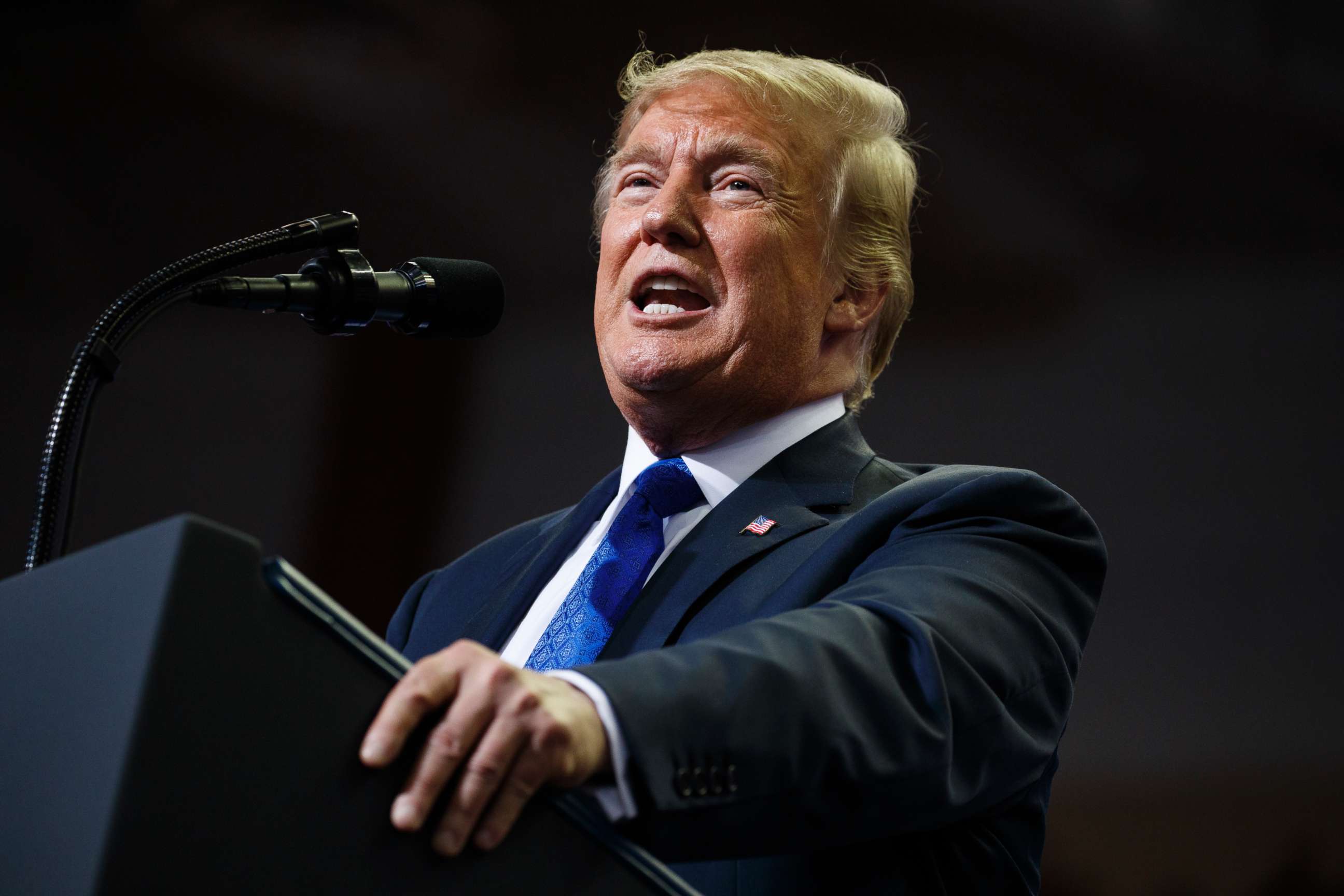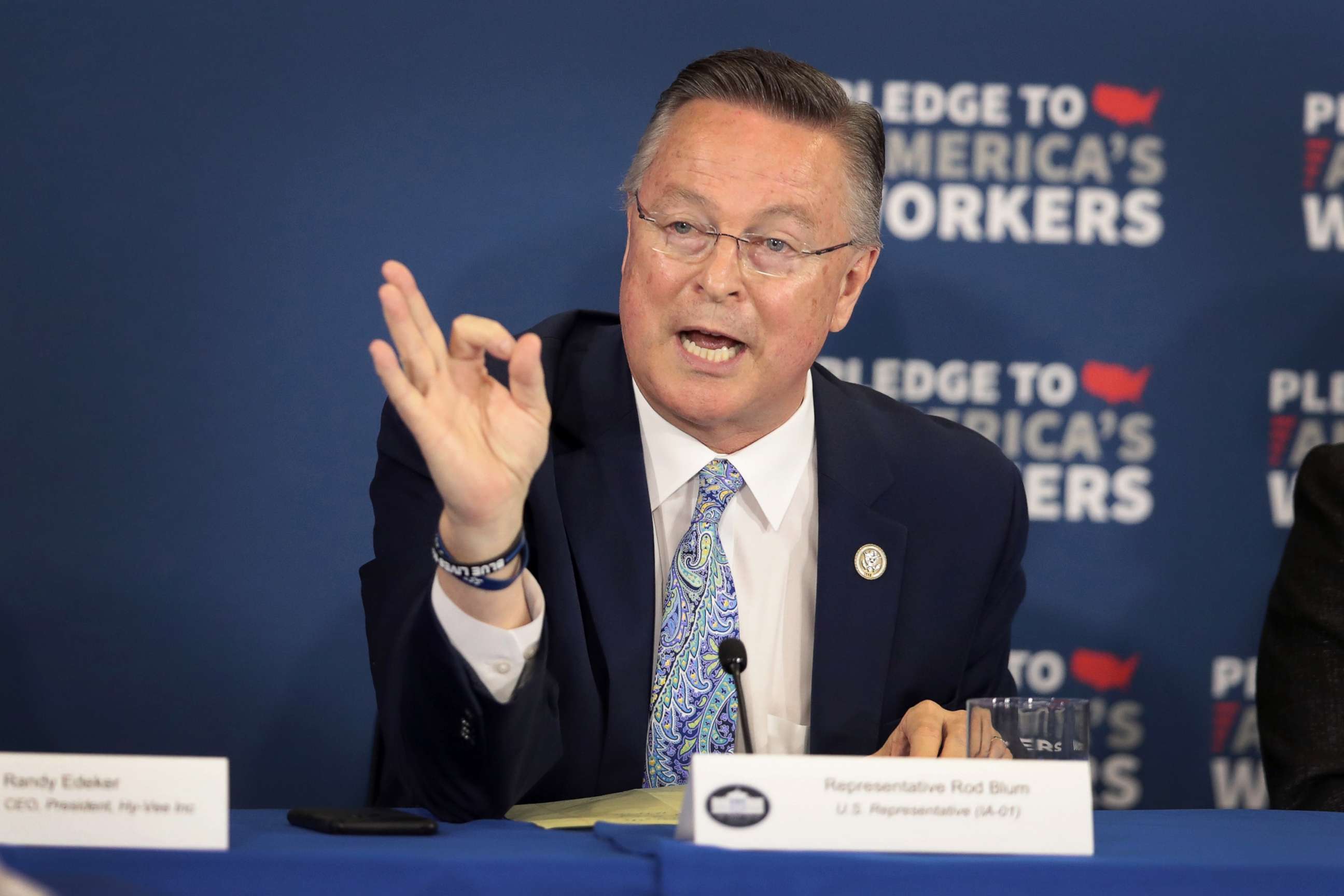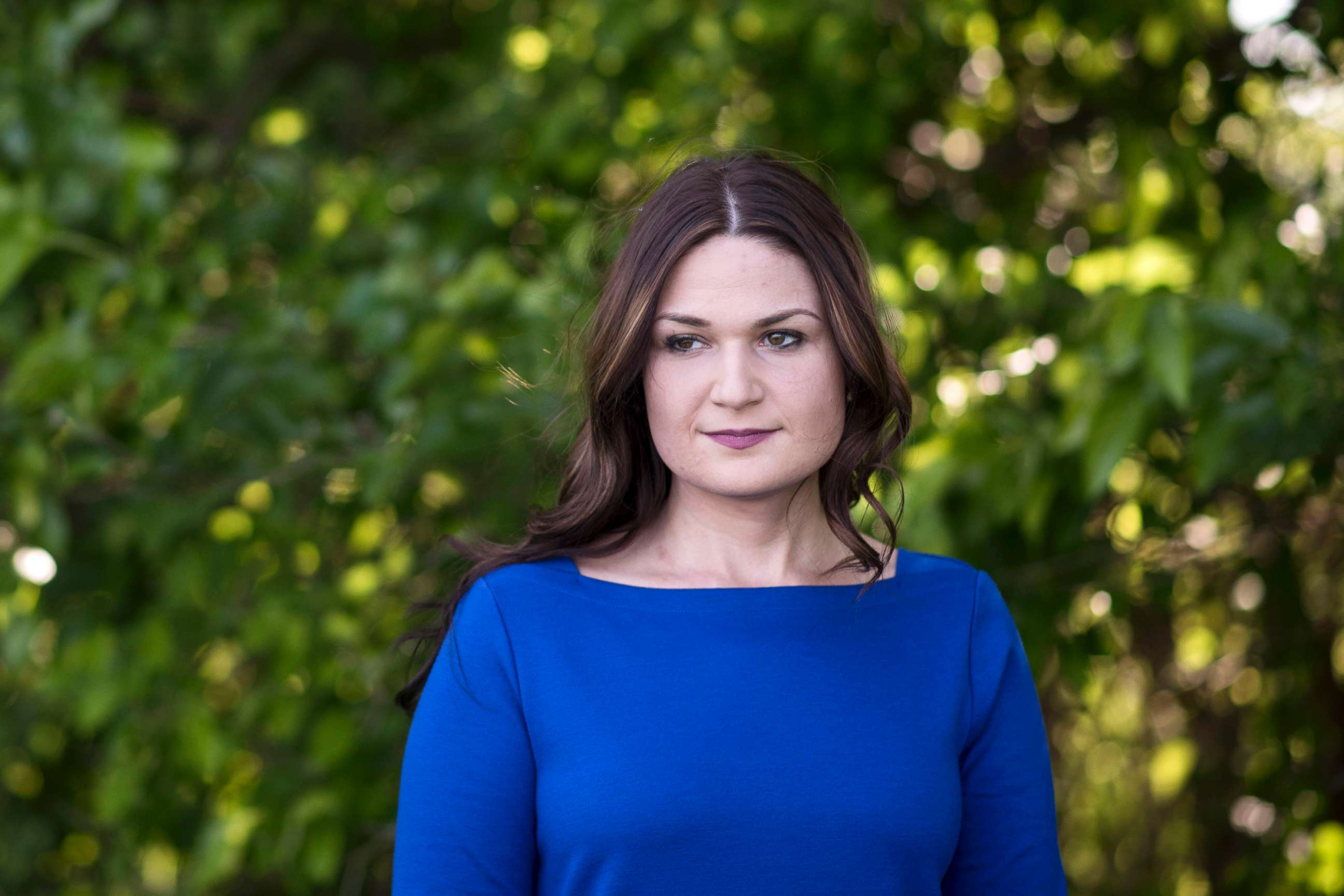Will Iowa voters who flipped for Trump have 'buyer's remorse' in 2018?
Iowa's 1st District flipped from blue to red in 2016. Will it flip back in 2018?
CEDAR FALLS, IOWA -- A district in Iowa that voted for former President Barack Obama twice before flipping for President Donald Trump in 2016 is, two years later, still finding its political identity.
Iowa’s 1st Congressional District held its first debate ahead of the midterms Friday night in a crowded auditorium on the University of Northern Iowa’s campus.
Two-term Republican incumbent Rep. Rod Blum, a Trump supporter and member of the House Freedom Caucus, faced Democratic challenger Abby Finkenauer, a 28-year-old state representative who has been endorsed by several progressive women’s groups, including NARAL Pro-Choice America and EMILY’s List.
Voters who attended, as well as the debate moderators, suggested that this year’s election feels like a chance for the district to decide if they’re happy with the Republican vision for the country.
“We used to be kind of the purple state. We didn’t vote one way or the other. We voted what we thought was best,” said Jennifer Wolff, a 47-year-old occupational therapist from Waverly, Iowa, after the debate.
“And now we've gone Republican,” she finished.
Iowa’s first district is comprised of 20 counties and has a “purple” past. Obama won every county in the district in the 2008 presidential election and then 17 counties in 2012.
But that all changed in 2016, with Trump carrying 18 counties -- flipping 15 that had supported Obama in 2012.
Iowan voters at the debate from both parties acknowledged the political switchback seemed to be a reaction to Obama’s reputation as a hope candidate and a change-maker -- though they had different reasons for why that caused the flip.
Some, like Wolff, said it’s because Obama brought on too much social change for this Iowa district at too fast of a pace.
“I think we're on the verge of a lot of social change and Iowa is very conservative,” Wolff said, adding that she traced the “kickback” to people being “afraid of change.”
Wolff, a Democrat, plans to vote for Finkenauer in November.
But others, like Joe McGough, 50, a Republican who said he plans to vote for Blum, said it wasn’t the hope and change voters were looking for.
“I think a lot of people felt that under Obama, they were given false hope,” said McGough, a Cedar Falls resident and medical equipment sales representative.
“Or that the actions that he took as president didn't represent mainstream America. It was more progressive, more liberal,” McGough continued. “What Trump brought was really just an everyday approach to trying to solve problems.”

As a Republican, McGough voted for Trump over Hillary Clinton in 2016 -- though he voted for former President Bill Clinton when he was on the ticket.
Christopher Merck, a 23-year-old student at the University of Northern Iowa and a Republican, also explained the change in the district as a manifestation of disappointment in Obama.
“People felt like Obama and the Democrats abandoned them and just left them out to dry,” Merck said.
But Merck didn’t vote for Trump in 2016. Instead, he wrote in former presidential candidate Mitt Romney and Paul Ryan, Romney's running mate in 2012 and now the Speaker of the House.
“I support some of the things he does but don’t personally support him,” Merck said of Trump. “I think he has big character flaws and he also doesn’t handle himself in a respectable manner.”
Merck said he hasn’t decided whom to vote for in the upcoming House race. Other undecided voters he’s talked to who did vote for Trump have expressed “buyer's remorse” spilling over from 2016, he said, which could swing their votes.
Nearly 40 percent of registered voters in the district do not identify with either of the major political parties, and those voters will likely have the largest impact on the midterm race.
“I do think there’s some buyer's remorse, especially for Independents who voted for Trump,” Merck said. “Independents seem to be leaning Democratic when I talk to them, but the Republicans are still pretty strong with the Trump train.”
Many of the issues facing constituents seemed to play on a larger, national level that carried beyond this one Iowa district -- candidates’ responses on health care, the president’s Supreme Court pick and tariffs warranted the largest claps and boos from the audience.
In a district with a largely agricultural community, the trade war with China looms large. Iowa is the second-highest producing state for soybeans in the country, growing about 12 percent of the nation’s soybeans a year, according to the Iowa Soybean Association.
Blum -- who has voted with President Trump 92 percent of the time, according to Fivethirtyeight’s tracking -- expressed his support for the president on trade.
“I believe the president. He broke Canada, he will break China, and our farmers will come out ahead for the next 20 years when these new trade deals are done,” said Blum.
But Finkenauer, whose sister and brother-in-law are corn and soybean farmers in the district, argued that farmers weren't so sure.
“This whole idea that it's all about ‘be patient, be patient, it’ll all be worth it in the long run,’ and I’m out there talking to our farmers and, quite frankly, they are concerned,” Finkenauer shot back.

Blum acknowledged that record-breaking crops and uncertainty in the market have caused prices to drop, but said he believes farmers know that the short-term setback will lead to good down the road.
“The farmers I talk to, 95 percent of them say, ‘Yes, the prices are down right now, these are tough times right now, but we are willing to hang in there in the short term to have long-term prosperity,’” said Blum.
McGough said he supported Blum’s response, which mirrored Trump’s own rhetoric closely.
“I think Rod hit it on the head,” McGough said. “I mean, I think he admitted that right now, farmers are hurting. I think he was honest and forthright about that ... but I also think that Rod sees the big picture.”
But Mickey Dunn, a Democrat who’s hoping Finkenauer will flip the district, had stronger concerns about the impact on farmers.
“I've been around long enough that I remember when we had the farm crisis in the 80s,” said Dunn, who attended the debate with her adult son.
“And people lost their farms, and they went bankrupt, and people committed suicide, and it was ugly. And it could happen again. If crop prices drop precipitously, that can happen again,” she said.
The candidates were also asked about embattled Supreme Court Nominee Brett Kavanaugh and whether they believed he should be confirmed, with both sticking to their party’s argument.
Finkenauer said a lifetime appointment to uphold the constitution on the court requires the “utmost character,” and she believes Kavanaugh’s has come into question.
“We need to believe survivors, and the fact is I have very serious concerns about judge Kavanaugh. And when this is a lifetime appointment, we better take those concerns seriously and take our time with it,” Finkenauer said.
Kavanaugh's nomination to the Supreme Court has been clouded by controversy after three women accused him of sexual misconduct. He has denied the allegations.
Blum agreed that assault victims should be believed and felt "sorry" for both Kavanaugh and Christine Blasey Ford, who said Kavanaugh tried to rape her when they were both teenagers.
But he said that more corroboration of Ford’s story was needed to disqualify Kavanaugh.
“In our country there is a legal burden, you are innocent until proven guilty, not guilty until proven innocent. And there has been no corroboration of those facts,” said Blum.

Both candidates elicited applause for their stance, and voters seemed to split down party lines.
McGough, a father himself to a 24-year-old daughter, said while he believed both Kavanaugh and Ford could be considered truthful but felt Democrats were unfair to Kavanaugh during the Judiciary Committee hearing.
“In my opinion, her character wasn't assassinated. His character was assassinated. And it was assassinated by the Democrats on the Senate,” McGough said.
Wolff, a Democrat, said she believes the battle is bigger than just Kavanaugh -- and speaks to the larger issue of sexual assault.
“I think so much of that has gone on for so long and has just been underlying and the fear of that coming out and the women being empowered by that is scary to a lot of men in strong places,” Wolff said.
With election day just a month away, voters will soon head to the polls to cast their vote, which could reveal if those who flipped for Trump stand by that decision.
“People are very torn,” Wolff said when asked if her Republican friends stand by the president.
“They don't like Trump but still believe in some of the things that he's doing. And so they're kind of torn on what to do. You know, ‘Do we need to vote in change or do we stick with this and see what happens?’”




